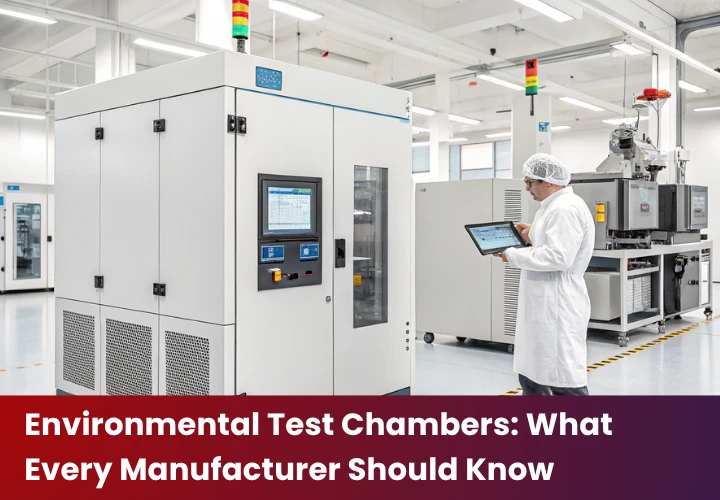
In today’s competitive industrial landscape, ensuring product reliability is no longer optional—it’s expected. Whether you’re manufacturing electronics, automotive components, or home appliances, your products must perform consistently in the environments your customers use them. This is where the environmental test chamber becomes an essential tool for manufacturers.
But what exactly is an environmental chamber, and why is it vital for modern manufacturing? Let’s break it down.
What Is an Environmental Test Chamber?
An environmental test chamber is a controlled testing enclosure that simulates real-world ecological conditions, such as:
- Extreme temperatures (hot and cold)
- Humidity and moisture
- Thermal shock
- Corrosive atmospheres
- Altitude
- UV exposure
- Dust or salt spray
These chambers are used to evaluate how products behave under varying climatic conditions, helping manufacturers assess durability, performance, and compliance with industry standards.
Why Manufacturers Use Environmental Chambers
From electronics and defence to medical devices and consumer appliances, here are key reasons why environmental chambers are crucial:
1. Product Reliability
A small electronic component may function perfectly at room temperature but fail in a cold climate or overheat during summer. Environmental chambers simulate these conditions to test longevity and reliability before market release.
2. Compliance with Global Standards
Regulatory bodies like ISO, IEC, and ASTM demand proof of environmental resilience. Chambers allows you to meet these standards and generate detailed testing reports.
3. Faster Product Development
By stress-testing prototypes, you can identify design flaws early and reduce costly recalls or warranty claims. It speeds up R&D while ensuring high quality.
4. Customised Testing for Every Industry
Delta Stark Engineering, for instance, provides tailored test chambers for specific industries:
- Refrigerator manufacturers use psychrometric chambers to test cooling performance in varying humidity.
- Automotive sectors simulate extreme temperatures for engine parts or dashboards.
- Electronics firms use thermal cycling chambers to test printed circuit boards.
Key Features to Look For
When choosing an environmental test chamber, look for:
- Precision and stability of controls
- Wide temperature and humidity range
- Safety interlocks and alarms
- Data logging and remote access
- Energy efficiency
Delta Stark’s chambers, for example, come with programmable controllers, digital HMI displays, and integrated sensors to ensure accurate test replication and easy documentation.
Types of Environmental Test Chambers
Depending on the product and test goals, different chamber types are available:
| Chamber Type | Description | Ideal For |
|---|---|---|
| Temperature Chambers | Simulate high/low temperatures (-70°C to +180°C) | Electronics, plastics |
| Humidity Chambers | Control moisture levels (10% to 98% RH) | Consumer appliances |
| Thermal Shock Chambers | Rapid temperature changes between two zones | Automotive, aerospace |
| Salt Spray Chambers | Simulate corrosion and rust conditions | Metal components, coatings |
| Vibration Chambers | Combine mechanical vibration + temperature | Automotive testing |
| Psychrometric Chambers | Regulate temperature and humidity | Refrigerator and washing machine testing |
Real-World Applications: How It Impacts You
Let’s take a refrigerator manufacturer as an example.
They must prove that a refrigerator can maintain performance from 15°C (cold climate) to 45°C (hot summer). Using a psychrometric chamber, engineers can simulate both dry and humid conditions to assess cooling speed, energy consumption, compressor cycles, and insulation reliability. This ensures the appliance performs consistently across geographies and seasons.
The same logic applies to:
- Electric car battery testing
- Smartphone display durability
- Medical device shelf life
At Delta Stark Engineering, our environmental test chambers are backed by a team of certified test engineers with over a decade of industry experience. Every chamber is:
- Designed in compliance with ISO/IEC standards
- Calibrated for Precision and repeatability
- Field-tested for sectors like automotive, white goods, and defence
We also provide installation, training, maintenance, and remote diagnostics, ensuring you’re supported through the entire testing lifecycle.
